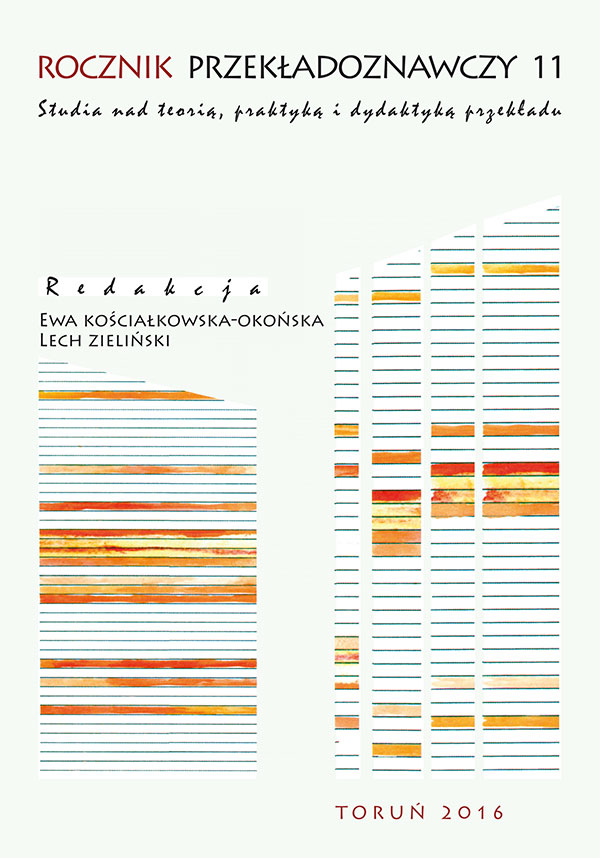Competence in translating specialist texts – an analysis of selected problems in popular science texts
DOI:
https://doi.org/10.12775/RP.2016.013Keywords
specialist language, popular science texts, translation competence, translation strategies, translation errorsAbstract
Specialized translation is a dynamically developing area and a popular subject of scholarly reflection. Together with the growing variety of specialist languages, there is also an observable increasing demand for translations of diverse types of text, including popular science publications. The article is devoted to this genre, which is relatively less frequently discussed than classical areas such as medical or technical translation. An attempt is made to establish the position and distinctive features of popular science texts in the context of existing typologies. Translation problems typical of the genre are addressed from the perspective of translation competence and training. Major types of skills required from a translator of popular science texts are presented in relation to existing models of competence. The aim of the study discussed in the empirical part of the paper is to diagnose what types of problems are the most challenging for trainee translators and what textual tendencies are the most prominent in their translations from English into Polish. The analysis of the data gathered focuses on types of solutions adopted by the students in their renditions of terminology and proper names. The results of the study demonstrate a strong tendency to use established Polish equivalents for commonly known terms, frequently together with borrowing the original one. They were less consistent in translating items closely intertwined with the source culture. Major mistakes, including stylistic ones, occurred in this context, which confirms a need to put more emphasis on the differences in textual conventions in regard to style and register. The findings are meant to facilitate the training process.
References
Belczyk, A., 2009, Poradnik tłumacza, Kraków.
Brzeziński, J., Strelau, J., 2004, „Psychologia w Polsce po 1989 roku”, [w:] Nauka, nr 2, s. 125–148.
Byrne, J., 2012, Scientific and Technical Translation Explained, Manchester.
Chłopicki, W., Świątek, J., 2000, Angielski w polskiej reklamie, Warszawa.
Czuchnowska, H., Orzechowska-Bączyk, M., 2010, „Pierwsza pomoc psychologiczna”, [w:] Niebieska linia, nr 6, http://www.niebieskalinia.pl/pismo/wydania/dostepne-artykuly/4983-pierwsza-pomoc-psychologiczna (dostęp: 10 lipca 2015).
Dybiec-Gajer, J., 2013, Zmierzyć przekład. Z metodyki oceniania w dydaktyce przekładu pisemnego, Kraków.
Dzierżanowska, H., 1990, Przekład tekstów nieliterackich na przykładzie języka angielskiego, Warszawa.
Gajda, S., 2001, „Styl naukowy”, [w:] Współczesny język polski, J. Bartmiński (red.), Lublin, s. 183–199.
Gajewska, E., Sowa, M., 2014, LSP, FOS, Fachsprache...: dydaktyka języków specjalistycznych, Lublin.
Grucza, S., 2013, Lingwistyka języków specjalistycznych, Warszawa.
Hejwowski, K., 2004, Kognitywno-komunikacyjna teoria przekładu, Warszawa.
Investigating Translation Competence, 2000, A. Beeby, D. Ensinger, M. Presas (red.), Amsterdam.
Kościałkowska-Okońska, E., 2013, „Dydaktyka przekładu tekstów specjalistycznych w kontekście rozwoju kompetencji tłumaczeniowej”, [w:] Rocznik Przekładoznawczy. Studia nad teorią, praktyką i dydaktyką przekładu, t. 8, s. 137–155.
Kozłowska, Z., 2007, O przekładzie tekstu naukowego (na materiale tekstów językoznawczych), Warszawa.
Kussmaul, P., 1995, Training the Translator, Manchester.
Małgorzewicz, A., 2014, „Językowe i niejęzykowe kompetencje tłumacza. Próba zdefiniowania celów translodydaktyki akademickiej”, [w:] Lingwistyka Stosowana, nr 11, s. 1–10.
PACTE 2000, „Acquiring Translation Competence: Hypotheses and Methodological Problems in a Research Project”, [w:] Investigating Translation Competence, A. Beeby, D. Ensinger, M. Presas (red.), Amsterdam, s. 99–106.
PACTE 2003, „Building a Translation Competence Model”, [w:] Triangulating Translation: Perspectives in Process Oriented Research, F. Alves (red.), Amsterdam, s. 43–66.
PACTE 2009, „Results of the Validation of the PACTE Translation Competence Model: Acceptability and Decision Making”, [w:] Across Languages and Cultures, vol. 10, nr 2, s. 207–230.
Pieńkos, J., 2003, Podstawy przekładoznawstwa. Od teorii do praktyki, Kraków.
Pisarska, A., Tomaszkiewicz, T., 1998, Współczesne tendencje przekładoznawcze, Poznań.
Psychologia i życie, 1999, P. Zimbardo, Warszawa.
Resurreccio, V.M., Davies, M.G., 2007, Medical Translation Step by Step, Manchester.
Torresi, I., 2010, Translating Promotional and Advertising Texts, Manchester.
Wojciszke, B., 1999, „Przedmowa do polskiego wydania”, [w:] Psychologia i życie, P. Zimbardo, Warszawa, s. xiii-xiv.
Współczesny język polski, 2001, J. Bartmiński (red.), Lublin.
Downloads
Published
Issue
Section
Stats
Number of views and downloads: 642
Number of citations: 0



